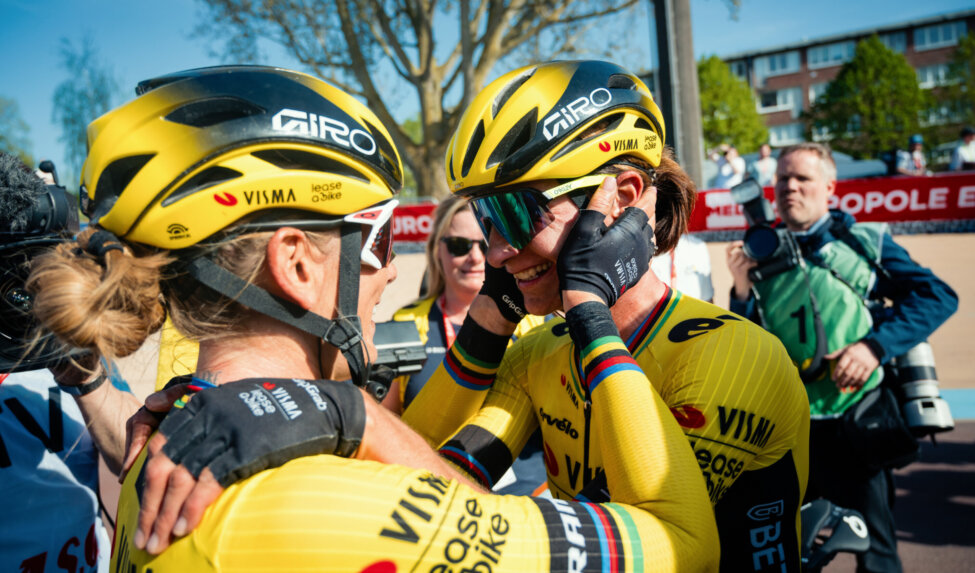Team LottoNL-Jumbo forced to end MPCC membership
Team LottoNL-Jumbo has been forced to end her membership with the MPCC (Mouvement Pour Cyclisme Crédible). Earlier this season, George Bennett did not start in the Giro d'Italia because of a low cortisol level. Bennett underwent several additional tests, which proved that he was kept out of the Giro unjustly. This, as well as advises from external experts, shows that the MPCC procedure is not a 100% accurate. There has been a lot of contact between the team and the MPCC. Within the MPCC, it was impossible to realise an adjustment of procedures regarding the measurement of cortisol levels before the general meeting in October, this to prevent riders from unjustly being kept from racing. Team LottoNL-Jumbo cannot conform to a procedure that is not a 100% accurate. The team supports the MPCC’s standpoints and, for this reason, regrets this difficult decision.
Standpoints
The team endorses the MPCC’s standpoints and applauds the movement’s philosophy. The MPCC has contributed to the necessary changes within the culture of cycling, and Team LottoNL-Jumbo voluntarily abides by many of their rules. The MPCC has also accomplished several things within the UCI, and we value the MPCC in this.
Unnecessary image and sportive damage
“Our team supports the battle against the abuse of corticosteroids in cycling. However, a low cortisol level is not always the result of substance abuse, and a low cortisol level certainly does not always mean an unhealthy situation. For this reason, we, as well as other teams/ team physicians and riders, are of the opinion that the procedure surrounding the monitoring of low cortisol levels should be adapted, to prevent riders unjustly being kept out of races and teams suffering unnecessary image loss and sportive damage.
We know that the procedure is not a 100% accurate, as should be the case in such procedures. Two of our riders have been kept from racing unjustly (Vuelta 2013 and Giro 2015) due to this inaccuracy. Knowing the flaws in this system, we cannot justify a rider being excluded from entering a race any longer,” managing director Richard Plugge explains.
Examination external experts
Nearly two years ago, during the general meeting of the MPCC, various team physicians have requested an examination by external experts to answer the question if a too low cortisol level is always unhealthy. This to prevent healthy riders being kept out of races unjustly.
One of the experts, approached by the MPCC, has responded during the Giro d’Italia. His conclusion: the current procedure, during which only the cortisol levels of one morning are determined, is lacking precision and can lead to false positive results, after which healthy riders are unjustly being kept out of races. He advises additional tests once a low cortisol level is measured.
The experts consulted by Team LottoNL-Jumbo, including a professor Endocrinology, endorse this standpoint. Additional tests proved that there was never an unhealthy situation, nor the abuse of external corticosteroids within our team.
#Ridethefuture
Team LottoNL-Jumbo will continue to disperse the MPCC’s standpoints. We put a lot of effort in contributing towards a cultural change within cycling and will continue to do so. Our motto is #ridethefuture for a reason!
Standpoints
The team endorses the MPCC’s standpoints and applauds the movement’s philosophy. The MPCC has contributed to the necessary changes within the culture of cycling, and Team LottoNL-Jumbo voluntarily abides by many of their rules. The MPCC has also accomplished several things within the UCI, and we value the MPCC in this.
Unnecessary image and sportive damage
“Our team supports the battle against the abuse of corticosteroids in cycling. However, a low cortisol level is not always the result of substance abuse, and a low cortisol level certainly does not always mean an unhealthy situation. For this reason, we, as well as other teams/ team physicians and riders, are of the opinion that the procedure surrounding the monitoring of low cortisol levels should be adapted, to prevent riders unjustly being kept out of races and teams suffering unnecessary image loss and sportive damage.
We know that the procedure is not a 100% accurate, as should be the case in such procedures. Two of our riders have been kept from racing unjustly (Vuelta 2013 and Giro 2015) due to this inaccuracy. Knowing the flaws in this system, we cannot justify a rider being excluded from entering a race any longer,” managing director Richard Plugge explains.
Examination external experts
Nearly two years ago, during the general meeting of the MPCC, various team physicians have requested an examination by external experts to answer the question if a too low cortisol level is always unhealthy. This to prevent healthy riders being kept out of races unjustly.
One of the experts, approached by the MPCC, has responded during the Giro d’Italia. His conclusion: the current procedure, during which only the cortisol levels of one morning are determined, is lacking precision and can lead to false positive results, after which healthy riders are unjustly being kept out of races. He advises additional tests once a low cortisol level is measured.
The experts consulted by Team LottoNL-Jumbo, including a professor Endocrinology, endorse this standpoint. Additional tests proved that there was never an unhealthy situation, nor the abuse of external corticosteroids within our team.
#Ridethefuture
Team LottoNL-Jumbo will continue to disperse the MPCC’s standpoints. We put a lot of effort in contributing towards a cultural change within cycling and will continue to do so. Our motto is #ridethefuture for a reason!








